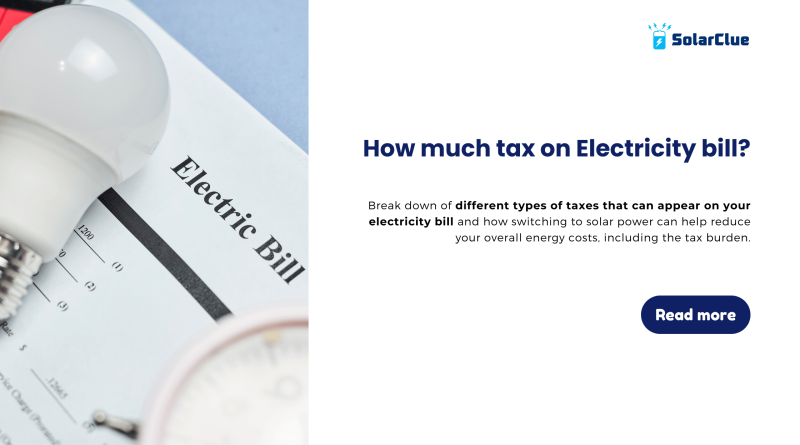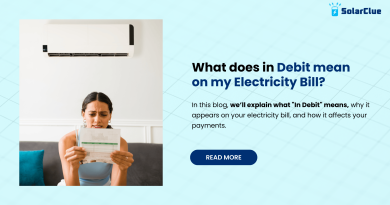How much tax on Electricity bill?
When you receive your electricity bill, it includes various components beyond just the cost of the electricity you consume. Among these components is tax, which varies depending on where you live and your electricity consumption. Understanding how much tax you pay on your electricity bill can help you better manage your overall energy expenses.
In this blog, we’ll break down the different types of taxes that can appear on your electricity bill and how switching to solar power can help reduce your overall energy costs, including the tax burden.
Table of Contents
- 1 Common Types of Taxes on Electricity Bills
- 1.1 1. Electricity Duty
- 1.2 2. Goods and Services Tax (GST)
- 1.3 3. State-Specific Cess or Surcharge
- 1.4 4. Tariff and Regulatory Charges
- 1.5 5. Fuel Adjustment Charges (FAC)
- 1.6 How Solar Power Can Help You Avoid Higher Electricity Taxes
- 1.7 Why Choose SolarClue for Your Solar Power Needs?
- 1.8 Comparison: Traditional Grid Electricity vs. Solar Power
- 1.9 Call to Action: Reduce Your Electricity Bill and Taxes with SolarClue
Common Types of Taxes on Electricity Bills
The taxes applied to your electricity bill can vary by state or region, as well as by your usage category (residential, commercial, or industrial). Here are some common taxes and charges you might find on your electricity bill:
1. Electricity Duty
Electricity Duty is one of the most common taxes levied on electricity bills in India. It is imposed by state governments and varies from state to state. The rate can range from 5% to 15% of your total electricity bill, depending on your state and the type of consumer (residential, commercial, or industrial).
For example:
- In Maharashtra, the electricity duty for residential consumers is around 9-12% of the total bill.
- In Karnataka, electricity duty is around 5% for residential consumers.
- In Delhi, electricity duty for domestic consumers is 5%.
2. Goods and Services Tax (GST)
GST is typically not charged on residential electricity bills in India. However, it may apply to commercial and industrial electricity consumers. The current GST rate on electricity for these categories is 18%.
3. State-Specific Cess or Surcharge
Some states levy additional surcharges or cess on electricity bills to fund specific state programs or infrastructure projects. These charges can vary widely by region and are often listed separately on your bill.
4. Tariff and Regulatory Charges
In some cases, there are additional regulatory charges imposed by electricity regulators to fund the maintenance and development of the grid or to balance out the costs associated with producing electricity.
5. Fuel Adjustment Charges (FAC)
Some electricity providers include a Fuel Adjustment Charge based on fluctuations in fuel costs used to generate electricity (like coal, natural gas, etc.). This charge is not technically a tax but often increases your overall bill.
Breakdown of Taxes on a Sample Electricity Bill
Here’s an example of how the taxes and duties might appear on your electricity bill:
| Charge Description | Amount |
|---|---|
| Energy Consumption (kWh) | ₹1,500 |
| Electricity Duty (10%) | ₹150 |
| State Cess/Surcharge | ₹50 |
| Fuel Adjustment Charge (FAC) | ₹100 |
| Total Bill Amount | ₹1,800 |
In this example, the consumer pays 10% electricity duty along with a state surcharge and FAC. Depending on where you live, these numbers may vary.
How to Reduce Your Electricity Bill and the Associated Taxes
While taxes are unavoidable, one of the most effective ways to reduce your overall electricity bill, including the taxes you pay, is by reducing your electricity consumption. The less electricity you use, the lower your total bill, and consequently, the less tax you’ll have to pay. Here are some strategies to help:
1. Use Energy-Efficient Appliances
Switching to energy-efficient appliances like LED bulbs, inverter ACs, and energy-efficient refrigerators can significantly reduce your electricity consumption and lower your bill.
2. Install Solar Power to Reduce Grid Consumption
One of the best long-term solutions for reducing your electricity bill and the associated taxes is by switching to solar power. With solar energy, you generate your own electricity from sunlight, reducing your reliance on grid electricity.
By consuming less grid electricity, you’ll not only reduce the base cost of your bill but also lower the taxes associated with it, as taxes like Electricity Duty are typically applied as a percentage of your total bill.
How Solar Power Can Help You Avoid Higher Electricity Taxes
Solar energy provides an excellent way to minimize your electricity consumption from the grid, and as a result, lower the taxes you pay on your electricity bill. Here’s how:
1. Generate Your Own Electricity
By installing a solar power system, you can generate your own electricity using sunlight, reducing the amount of power you need from the grid. This means you’ll pay less for energy consumption and consequently less in taxes.
2. Long-Term Financial Savings
Solar panels provide free electricity once installed. Over time, you’ll see a substantial reduction in your electricity bills, with most solar systems paying for themselves in 4-7 years. After that, the electricity you generate is essentially free, significantly reducing your overall energy costs.
3. Insulation from Rising Taxes and Tariffs
As governments adjust tax rates or impose new surcharges on electricity, solar power can protect you from future hikes in these charges. By reducing your dependency on grid electricity, you’ll be less affected by tax increases or new regulatory charges.
4. Take Advantage of Government Incentives
The Indian government offers a range of incentives, subsidies, and tax benefits for solar power installations. These can help offset the initial cost of switching to solar and make the investment more affordable.
Why Choose SolarClue for Your Solar Power Needs?
If you’re considering switching to solar power to reduce your electricity bills and taxes, SolarClue is the ideal partner for your solar energy needs. Here’s why SolarClue is the best choice:
1. High-Quality Solar Products
SolarClue offers premium solar panels, inverters, and batteries from trusted brands like Tata Power Solar, Luminous, Havells, and Sukam. These high-performance products ensure maximum energy generation and efficiency.
2. Personalized Solar Solutions
At SolarClue, we provide customized solar solutions tailored to your energy consumption and budget. Our team of experts will assess your needs and recommend the most suitable solar power system for your home or business.
3. End-to-End Service
From consultation and installation to post-installation support, SolarClue provides comprehensive end-to-end service. We take care of the entire process, ensuring a hassle-free transition to solar power.
4. Financial Benefits
SolarClue helps customers take advantage of government subsidies, tax incentives, and financing options to make solar power more affordable. These benefits can significantly reduce the upfront cost of installing solar panels.
Comparison: Traditional Grid Electricity vs. Solar Power
| Factors | Traditional Grid Electricity | Solar Power |
|---|---|---|
| Monthly Electricity Bill | High, includes taxes and surcharges | Low or zero after installation |
| Energy Source | Non-renewable (coal, gas, etc.) | Renewable (sunlight) |
| Taxes (Electricity Duty) | 5-15% of the total bill | None (on solar-generated power) |
| Cost Over Time | Increasing with inflation and demand | Fixed, long-term savings |
| Environmental Impact | High carbon emissions | Zero emissions, eco-friendly |
| Return on Investment | No direct return | Payback in 4-7 years, then free energy |
Call to Action: Reduce Your Electricity Bill and Taxes with SolarClue
If you’re looking to reduce your electricity bills and the taxes associated with them, switching to solar power is the best long-term solution. With SolarClue, you can enjoy premium solar products, personalized service, and significant energy savings.
Contact SolarClue today for a free consultation and start your journey toward reducing your electricity bills and taxes with clean, renewable solar energy. Don’t wait—make the switch to solar power and start saving now!
FAQs
1. What is the typical tax rate on electricity bills in India?
The tax rate on electricity bills varies by state but typically includes Electricity Duty (5-15%) and other state-specific surcharges.
2. Is GST charged on residential electricity bills?
No, GST is not typically charged on residential electricity bills, but it may apply to commercial and industrial consumers.
3. How much can I save by switching to solar power?
Switching to solar power can reduce your electricity bill by 50-90%, depending on your energy consumption and the size of your solar system.
4. Does SolarClue offer financing options for solar installations?
Yes, SolarClue provides flexible financing options and helps customers take advantage of government subsidies and tax incentives.
5. How long does a solar power system last?
Most solar power systems have a lifespan of 25 years or more, providing long-term savings and reliable energy.




